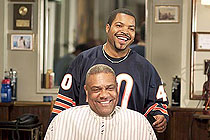|
|
|
|
Barbershop
2: Back in Business
|
 |
|
From Spike Lee's Joe's Bed-Stuy Barbershop (1983) to The Fighting Temptations (2003), barbershops have often figured in movies as an emblem of everyday, Afro-American experience. The Barbershop series returns this emblem to a particular style of filmmaking that was more popular in the '70s than it is today – loosely wound, episodic stories, full of wild talk, lurching from social drama to low comedy. The talk is everything in Kevin Rodney Sullivan's Barbershop 2. A bunch of garrulous barbers and their customers trade opinions and jokes about politicians, current events and pop culture. The film, like its '70s models such as Car Wash (1976), expresses a populist vision of social democracy. This shop, run by Calvin (Ice Cube), is open enough to embrace young and old, hip and daggy, professional and unemployed, as well as a token woman and a token white man. There is a plot intrigue of sorts – the menace of gentrification brought to this South Side neighbourhood by developers and entrepreneurs. Naturally, Calvin and his cohorts have to pull the community together around the barbershop, despite lucrative offers to sell-out. But it is mainly on the level of speech action that this democracy works out its principles and limits. Whenever old Eddie (Cedric the Entertainer) – we learn this time why he never has to pay for a haircut – puts it out there that he is about to broach a sensitive topic, he then discovers if the assembled throng is going to let him sound off or not. This spectacle gives political correctness a good name. This democratic goodwill has its clear limits, however. Odd flashbacks devoted to Eddie's youthful days in the '60s make a point of separating him from the militant Black Panthers (who try a little radical consciousness-raising on the barbershop floor) and also those brothers who, in a time of riots and civil unrest, exploit the possibilities of anarchy. The message of this film is simple: stand up for traditional values when you need to, but in the meantime just chill out and go with the flow. Proud, angry Afro-American directors of another era, like Melvin Van Peebles, might not approve of this pacifying sermon, but Barbershop 2 will nonetheless manage to charm and amuse anyone open to its sensibility. MORE Sullivan: Guess Who © Adrian Martin May 2004 |
![]()